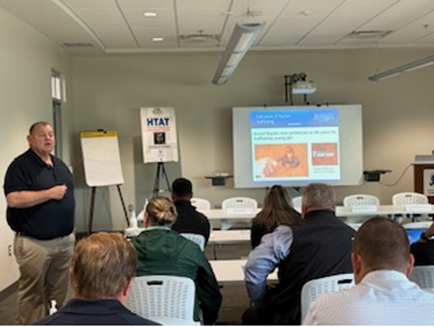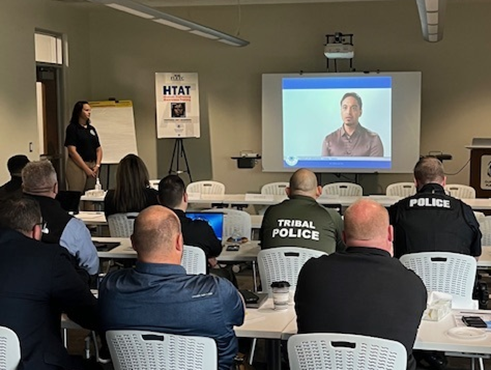Human trafficking is a pervasive and hidden crime that exploits vulnerable individuals through force, fraud, or coercion for labor or commercial sex.
As no community is immune from the impacts of human trafficking, the Federal Law Enforcement Training Centers (FLETC) coordinates Human Trafficking Awareness Training (HTAT) and offers it to state, local, tribal, and territorial law enforcement across the country at no cost. This program is classroom oriented with case studies, videos, and student-centered learning activities.
Earlier this year, the Match-E-Be-Nash-She Wish Band of Pottawatomi (Gun Lake Tribe) Public Safety Department contacted FLETC as they recognized human trafficking indicators within their community, specifically, in their new 250-room resort. Public Safety Director Thomas Raymond, said, “The Tribal Council and Tribal Leadership supports us in doing everything we can to prevent trafficking from occurring and training is absolutely essential to achieve that goal.”
On May 28, 2025, FLETC Instructors Hector Bencomo and Jennifer Calarco facilitated the FLETC HTAT in Shelbyville, Michigan. Fourteen law enforcement officers from the Gun Lake Tribe Public Safety Office, Huron Potawatomi Police Department, Allegan County Sheriff's Office and the Meridian Township Police Department were in attendance. Congressional staff from the Michigan delegation also observed this class.
The training incorporates representatives from the United States Attorney’s Office of the Western District of Michigan, Homeland Security Investigations Office from nearby Grand Rapids, Bureau of Indian Affairs Missing & Murdered Unit and representatives from various Non-Governmental Organizations. Joining together these various agencies can assist in providing essential services for victims of human trafficking. Bencomo said, “These representatives provided a local perspective on what types of trafficking are happening in their communities in and around the Gun Lake area.” In addition, officers were provided with local points of contact to assist with investigations and in the aid local NGO(s) could provide for survivors.
Training sessions were focused on the definition of human trafficking, highlighting indicators and reporting protocols, as well as a panel discussion with local subject matter experts. Bencomo highlighted the importance of, “Recognizing the signs of trafficking in vulnerable locations like hotels, casinos and communities is critical, especially when trafficking can sometimes be hidden in plain sight.”
Daily, nearly 30 million people around the world are victims of human trafficking. Creating awareness of these crimes, how they are perpetrated, and who is victimized is essential in developing ways to prevent human trafficking. For more information on Human Trafficking Awareness Training please visit Human Trafficking Awareness Training | Federal Law Enforcement Training Centers


###
Federal Law Enforcement Training Centers
Office of Public Affairs
Contact: 912-267-2447

